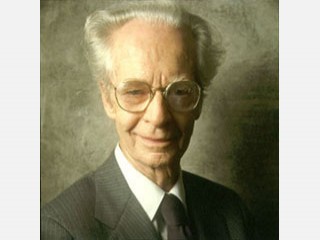
B.F. Skinner biography
Date of birth : 1904-03-20
Date of death : 1990-08-18
Birthplace : Susquehanna, Pennsylvania
Nationality : American
Category : Science and Technology
Last modified : 2011-01-25
Credited as : Psycologist, author and invetor, Behavior of Organisms
The American experimental psychologist Burrhus Frederic Skinner became the chief exponent of that form of behaviorism known as operationism, or operant behaviorism.
Born in Susquehanna, Ohio, B. F. Skinner attended Hamilton College. He then went to Harvard, where he received a master's degree in 1930 and a doctorate in experimental psychology in 1931. In 1936 he began teaching at the University of Minnesota, the same year he married Yvonne Blue; they had two daughters.
In Skinner's first book, Behavior of Organisms (1938), he "clung doggedly to the term reflex, thus allowing his immediate psychological roots in classical or early behaviorism." A Guggenheim fellowship enabled him to begin writing Verbal Behavior in 1941. He continued on the fellowship through 1945, finishing most of the manuscript. In 1947 he gave a course at Columbia University and the William James Lecture at Harvard, both based on Verbal Behavior, which, however, he put off publishing for 20 years. Walden Two (1948) described his notions on a feasible design for (utopian) community living.
In 1954 Skinner became chairman of the Department of Psychology at Indiana University and published "Are Theories of Learning Necessary?" Conferences begun at Indiana culminated in 1958 in a new journal, Journal of the Experimental Analysis of Behavior.
Toward the end of World War II, with the birth of his second child, Skinner built an air crib for baby care in which the infant, instead of staying in a tight crib wrapped in layers of cloth, can lie with only a diaper on in an enclosed space which is temperature-controlled and plastic-sheeted, thus allowing the child greater freedom of movement. Many babies are now raised in this way.
During the 1950s, stimulated by an interest in psycho-pharmacology, Skinner studied operant behavior of psychotics at the Metropolitan State Hospital in Waltham, Mass. For his systematic experiments on this type of behavior, Skinner designed his famous Skinner box, a compartment in which a rat, by pressing a bar, learns to repeat the act because each time he does so a pellet of food is received as a reward. Skinner demonstrated that when these reinforcements accompany or follow certain specific behavior, learning occurs in the experimental animal. Such a response, reinforced by food or other means, is called operant behavior and is distinguished from respondent behavior, which is elicited by a stimulus. Skinner's main concern in studying operant behavior and its parameters was neither "with the causal continuity between stimulus and response, nor with the intervening variables, but simply with the correlation between stimulus (S) and response (R)."
Skinner's books Verbal Behavior (1957), while omitting the citation of experimental evidence for its assertions, gives a highly objective functional account of language, with the basic unit of analysis being the verbal operant. He explains how differential social reinforcement from other members of the speech community forms, strengthens, or weakens dependency relations between stimulus variables and verbal responses. Included also are discussions of how listener "belief" is fortified by reinforced responses to a speaker's words; how the metaphorical expressions of a speaker reflect the kinds of stimuli which control his behavior; how and why it is that we cease verbalizing; suggestions regarding the nature of aphasia; and logical and scientific verbal behavior.
In Schedules of Reinforcement (1957) Skinner and his coauthors reported on a research program that was "designed to evaluate the extent to which an organism's own behavior enters into the determination of its subsequent behavior." They demonstrated that response rates, temporal patterns of rates, and patterning of rate in the temporal vicinity of the reinforcer are dependent upon the schedule of reinforcement. No detailed quantitative laws emerge, however, from their 70,000 hours of data gathering. Schedules is suggestive regarding the power of the operant as a tool to investigate psychopharmacological and neurophysiological problems.
Skinner acknowledged Roger Bacon as an influence on his thinking and formulating. Skinner said that he emulated him because Bacon rejected verbal authority; studied and asked questions of phenomena rather than of those who had studied the phenomena; classified in order to reveal properties; recognized that experimentation included all contingencies, whereas mere observation overstresses stimuli; and realized that if nature can be commanded, it must also be obeyed.
Critics of operationism maintained that it disregarded problems such as motives, personality, thought, and purpose or greatly diminished their relevance or importance. Although Skinner dealt with complex psychological problems, his mode of treatment of these problems was criticized as having been seriously limited. His basic behaviorist viewpoint itself has been questioned recently, in part because it rejects consciousness. The concept of consciousness cannot be omitted from psychology without a serious loss in explaining much that man does—since the viewpoint is completely indifferent to introspection.
On August 18, 1990 Skinner died and was buried at the Mt. Auburn Cemetary in Massachussetts. He left behind many distinctive awards and achievements. In 1968 he was awarded the National Medal of Science, in 1971 he was honored with the Joseph P. Kennedy, Jr. Foundation Award, and in 1985 was given the Albert Einstein School of Medecine award for excellence in psychiatry. Skinner continued to write throughout his later years, authoring such works as Enjoy Old Age (1983), Upon Further Reflection (1986), and Recent Issues in the Analysis of Behavior.
Skinner's autobiographical account is in A History of Psychology in Autobiography, vol. 5 (1967), edited by E. G. Boring. William S. Sahakian, ed., History of Psychology: A Source Book in Systematic Psychology (1968), has representative selections from Skinner's writings. Richard Isadore Evans, B. F. Skinner: The Man and His Ideas (1968), is a useful full-length study. Skinner's importance in the history of psychology is analyzed in the excellent study of Henryk Misiak and Virginia Staudt Sexton, History of Psychology: An Overview (1966).
















